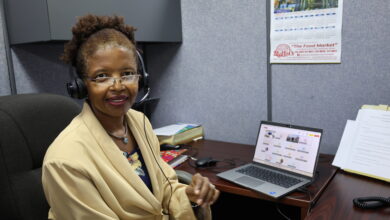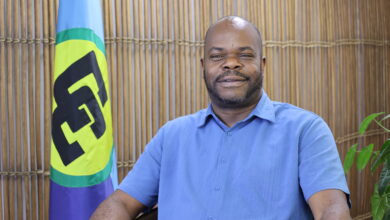SAVARIN: WTO FALLING OUT OF FAVOR WITH THE CARIBBEAN
CHRIST CHURCH, BARBADOS – With the Sixth World Trade Organization (WTO) Ministerial Conference just a week away, Dominica’s Minister of Foreign Affairs, Trade and Labour Hon. Charles Savarin has written an op ed (see below), that highlights on-going concerns that the Caribbean has with global trade talks. A member country of the particularly vulnerable group of CARICOM countries called the Organisation of Eastern Caribbean States (OECS), Dominica – a banana exporting country – has been especially hard-hit by recent developments in the multilateral trading system.
At a time when such small, vulnerable countries are openly questioning the WTO as being a friend or foe and public opinion in the Region having waned regarding the WTO, expectations of what the Ministerial will be able to achieve are being racheted down, given the gulf that remains in key areas under negotiation in faltering trade talks. Hopes for a far-reaching Ministerial were dashed last month, when WTO Director General Pascal Lamy admitted that there would have to be a “recalibration” of WTO talks regarding the year-end Ministerial, given on-going splits amongst Members, particularly over Agriculture. In recent weeks, pressure has increased on the EU to make concessions in agricultural tariff barriers and subsidies, to the chagrin of EU Trade Commissioner Peter Mandelson, who continues to insist that the EU has reached its limit in offering concessions in this area; arguing instead that the singular focus on Agriculture is not an approach that will be successful in securing momentum in WTO talks.
EU member states themselves are split on the plea for further concessions in farm trade, with France – a major beneficiary of EU farm subsidies – leading the charge against further concessions. Mandelson has repeatedly called for a shift in focus to areas like industrial goods tariffs. In what appeared to be a conciliatory move by Brazil and India in this area and the Service sectors, at a Group of Seven industrialized nations meeting in London over the weekend these two countries signaled that they would be willing to make concessions, conditional on developed countries further dismantling protection of their agricultural markets.
There is uncertainty as to what effect if any these recent developments will have on trade talks, as the EU did not show any willingness to move on its entrenched position on Agriculture, at an informal Ministerial meeting also convened over the weekend in Geneva. The United States, the European Union, Brazil, India, Japan and Australia were represented at that meeting. At this juncture, given the extent of progress in trade talks since the August Summer break, it is difficult to stave off assessments that the Hong Kong Ministerial will largely be a ‘stock-taking’ exercise.
WTO Falling Out of Favor with the Caribbean
by
Hon. Charles Savarin
Minister of Foreign Affairs, Trade and Labour
Commonwealth of Dominica
Precarious Future
These are difficult times for the Caribbean. Comprised of some of the world’s smallest, most vulnerable countries, the Region is in the throes of confronting what is an uncertain future, courtesy of the World Trade Organization (WTO).
Struggling as we are to find our place in the global economy, we in the Caribbean increasingly feel that the international community has turned its back on us. There is a notion amongst some that since our size is insignificant on a global scale, our issues certainly must be. We beg to differ.
The fact is, the Region’s trading interests are not innocuous. They mean the difference between throwing thousands into poverty or ensuring that the traditions, culture and economic fortunes of tens of thousands of Caribbean families are preserved. To the extent that our trading interests are severely compromised, so too will be social stability in these small, fragile Caribbean countries.
In recent times, the rules, norms and procedures of the multilateral trading system have pushed the Caribbean to the precipice of disaster. As we stand on the brink, we in the Region have been left to wonder if there is any empathy in the international community for the predicament in which the most vulnerable of Regions finds itself.
The relentless onslaught from the multilateral trading system has found expression in three important ways for the Caribbean. First is the changing nature of the multilateral trading system, brought about by far reaching changes as a result of the Uruguay Round and the establishment of the WTO. Second is the multilateral trade negotiation process itself, which has as its prime objective the opening of markets on a global scale. Called the Doha Development Round, these on-going trade talks are failing the Region. Third is the imminent threat to two life-blood industries in the Region, Bananas and Sugar, that recent WTO rulings are responsible for bringing about.
Global Trading System, Friend or Foe?
As a result of its geopolitical and economic history, for hundreds of years this small Region has had to interface with the international economy. Given their small size, being open to international trade has not been a choice, but a necessity for Caribbean countries. The Region has been quintessentially globalized for hundreds of years.
At the center of the global trading system is the WTO, overseeing the system and setting rules for it. The institution has come to be the flagship of the globalization process, best reflected by the expansion of international trade. The WTO has been the ‘enabler’ for freeing up trade, through successive rounds of negotiation. But, there have been casualties along the way.
However well intentioned the motivation to launch negotiations labeled as development-focused four years ago, the Round has failed so far to adequately position development at the centre of the multilateral trading system. The problem is that the outcomes of the Uruguay Round brought about significant and far reaching changes to the multilateral trading system, which held important negative implications for the development of the most vulnerable developing countries. First, the Uruguay Round resulted in a much broader and deeper trade agenda, that has been driven largely by the developed countries; and so they did not fully align with the interests of developing countries. Secondly, the Single Undertaking with its ‘all or nothing’ principle marked a significant departure from previous rounds, forcing countries to accept provisions that were not always in their interests. Thirdly, the long awaited goal of creating an international organization responsible for trade governance had been achieved in the WTO, but it is based on the predominant but disputable ideology that free trade benefits everyone. Fourthly, a more legalistic dispute settlement procedure was put in place, with quasi-judicial panels and appellate body. This was meant to ensure greater certainty in the process and reduce the role and use of power in the system, but instead it has ended up hurting the small, weaker and more vulnerable Members.
Furthermore, the WTO is no longer a small, closed club. In its ranks are a multitude of poor countries, all of different sizes and levels of development, which have fundamentally altered the WTO’s trade-off structure. Increased membership, currently standing at 148 countries – soon to increase to 150, has added to the complexity of mercantilist negotiations, especially in how burdensome decision-making has become; so much so that it has famously been characterized as ‘unwieldy’. Not helping matters, the issues on the table have become more complex and in some cases highly politicized – as is the case with Agriculture, currently the intractable sticking point in trade talks. While this dynamic has changed, so too has the geo-political environment. A bedfellow of global trade talks, the nature of international relations has shaped the dynamics of international commercial negotiating trade-offs. The Cold War that impacted international diplomacy over the last half of the twentieth century is now over, heralding a paradigm shift in international diplomacy and alliance-making.
Put together, these systemic changes have had the effect of crowding out the interests of small Regions like the Caribbean and have impacted negatively on how issues germane to these countries find expression in the negotiating agenda.
Doha Development Round, Reality or Mirage?
When the ‘Development Round’ was launched, it raised the expectations of poor countries, whose policy makers had long been keen on exploiting the synergies between trade and development. Cognizant of the importance of infusing a “development dimension” in WTO talks and thus launching a Round to be centered on development, poor countries lavished Doha Round architects with praise. Originally billed as a milestone, the initial euphoria for the Round as development-friendly was, however, short-lived.
There was a quick realization that in the mercantilist environment of trade negotiations, giving full expression to a “development dimension” is terribly problematic. The Doha Round as a staging-post to advance the interests of poor nations has been an elusive proposition, despite the fact that fully two-thirds of the WTO’s membership are developing countries. The irony of the Round’s name and the mis-steps in exacting an agenda with a fidelity to developing countries’ interests is ‘the elephant in the room’, so to speak. For us in the Caribbean, the failure of the Round, to date, to take on issues germane to us is a palpable betrayal of a promise that we believed was made in earnest.
Caribbean Bananas and Sugar on Precipice of Disaster
At a time when the Doha Round is failing the Caribbean, the WTO system is pushing this vulnerable Region into a corner over two commodities at the heart of its agricultural identity and social fabric. The prospects of the banana and sugar industries in the Region are being held to ransom by the multilateral trading system, poised precariously on the edge of an uncertain future. Recent WTO rulings have forced the hand of the EU to make decisions, that Caribbean countries have been barred from influencing, that threaten the livelihoods of tens of thousands of families in several Caribbean countries.
On November 29, the European Union announced a new import tariff of 176 euros per tonne, in respect of its tariff-only regime, to apply from January 1, 2006 to bananas imported mainly from Latin American or MFN suppliers. The new import regime will also include a duty-free annual import quota of 775,000 tonnes for ACP bananas, also to apply from January 1, 2006.
The single tariff rate has been widely criticized in the Caribbean. The tariff level will effectively cripple the Region’s banana industry, as it would inevitably lead to lower prices and incomes for farmers and the loss of predictability and stability. Some banana farmers in the Region will not be able to compete, and therefore face the prospect of being displaced from an industry that has sustained entire communities across the Caribbean for generations.
With regard to Sugar, the Caribbean has reacted with dismay, too, to the announcement November 24 that the EU would proceed with a 36 percent price cut in respect of its sugar regime. Although a decision was also taken to extend the transition period from two to four years, this does not soften the blow of the price cut. The decision is outrageous and unconscionable.
Doha Round Coming up Short in Advancing ‘Development’
With the Sixth WTO Ministerial looming, the Caribbean is questioning just how genuine the offensive now set in motion to extricate the Round’s “development dimension” from a state of limbo is. Somehow, the last minute jostling by some developed countries to bring to centre-stage talk of development has cheapened an agenda that from its very inception should have sought to advance a plan for poor countries to reap ‘development dividends’. Questions remain, too, over the nature of the development package that would ultimately be brought forward in any discussions on the issue at the Ministerial.
For all its promises to integrate development into the negotiating agenda, the Round has come up short thus far in making this a reality, as it has in placing development on the front-burner of the negotiating agenda.
But for us in the Caribbean, a fundamental concern remains. Issues of relevance to us are being marginalized in the process of global trade talks, and in some cases being systematically undercut. A particularly pernicious trend for the Region is what has become rather fashionable in WTO circles – arguing against trade preferences. In a world awash with free-market ideas and calls for “reciprocity”, privileged access to markets for the small and vulnerable is frowned upon. The fact is, neither trade nor market access by themselves are sufficient to promote development. For countries as small as those in the Caribbean with negligible shares of global trade, preferences harm no one. In the case of small preference-dependent economies, it is essential that due attention is paid to the consequences of precipitate preference elimination, as without satisfactory compensatory mechanisms the elimination of such arrangements would foreclose the Caribbean’s development options.
The Region, too, has been concerned by the attention of the international community to the plight of Least Developed Countries and Africa in respect of global trade. Not that such empathy and call to action is misplaced, but the effect of such singular focus has been that the Caribbean, that doesn’t necessarily fit the mould of poverty as central to its vulnerability, has become a forgotten Region. Yet the Region’s vulnerability is very real, not least in respect of small size.
With the WTO Ministerial (set for December 13 to 18 in Hong Kong) almost upon us, we in the Caribbean will find it extremely difficult to contribute to any consensus, unless our interests are taken on-board.





